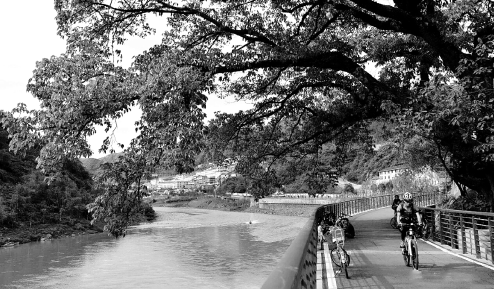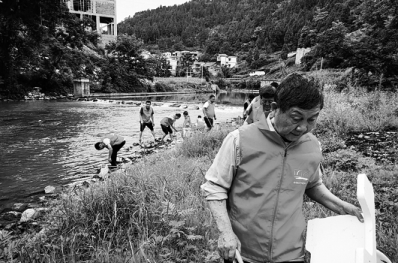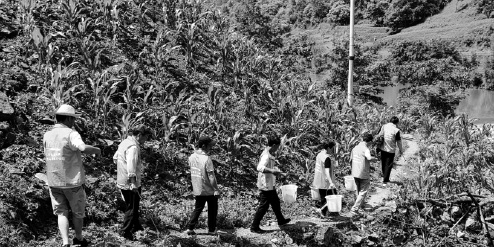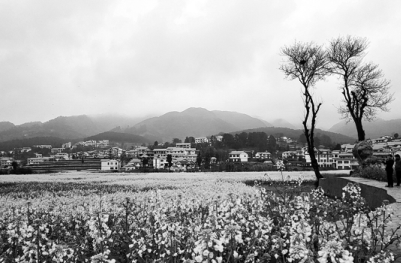PATROL TEAM'S GREEN EFFORTS PAY OFF
Hard work brings improvements to area of Guizhou

A group of people patrol the Wuma River, a branch of the Chishui River in Guizhou province, in their spare time-sometimes deep into the night.
They pick up waste and prevent people from fishing in the tributary, which runs for nearly 40 kilometers through the city of Renhuai.
The group's work is not only dirty but also dangerous, as team members sometimes face violence when they confront people fishing illegally in the waterway.
Despite this, the group of volunteers has been doing this work for more than four years as part of the Wuma Environmental Protection Society, the first such civil organization in Renhuai county, Zunyi.
As China steps up environmental conservation in the Yangtze River Basin, the society is just a small part of increased civil participation in joint efforts to restore the Chishui, a major tributary of the Yangtze.
The source of the Chishui, which runs for most of its length in Guizhou, is in Yunnan province, and it joins the Yangtze in Sichuan province. The Chishui flows for more than half its length, or some 236 kilometers, through Zunyi.
The environmental protection society was formed in Wuma township in 2017 with just 21 members.
Luo Guohong, 52, its founder, said schools of fish were once a common sight in the clear waters of the Wuma River.
However, in the 1990s, booming coal mining and papermaking industries in the area left the waterway heavily polluted, he said. There used to be 278 papermaking factories in the township, which had a population of more than 30,000, Luo added.
Thanks to efforts by local authorities to shut down polluting enterprises and divert wastewater to sewage disposal plants with the help of an upgraded network of sewer pipes, water quality in the river greatly improved, Luo said.
Despite this positive development, Luo and his friends found that before they established the society, weak environmental protection awareness among residents was a major factor hindering local improvement efforts.
Illegal fishing frequently occurred and many people continued to dump waste and discharge domestic sewage randomly into the waterway.
"Waste could be seen almost everywhere in the river," said Luo, who worked as an auxiliary police officer for more than 20 years before resigning from the post after the society was formed.
The river's water was so dirty that few residents wanted to take part in a boat race he organized during Spring Festival in 2017, Luo said. This made him and his friends more determined to establish the environmental organization.
The first thing members of the society did after it was formed was to advocate an environmentally friendly lifestyle by using loudspeakers fixed to cars and to hand out leaflets in local communities for nearly a month. They often performed such tasks during hot weather that left them bathed in sweat.
Their approach was so unusual to many villagers at the time that the team was referred to by some residents as "a group of people with a mental illness who don't know what to do after they fill their stomachs", Luo said.
Illegal fishing tackled
Undaunted, the team members quickly demonstrated how serious they were in promoting environmental protection by placing themselves at the forefront of a crackdown on illegal fishing.
On Jan 1, 2017, a 10-year fishing moratorium was introduced on the Chishui River, making it the first tributary of the Yangtze where fishing was banned. The prohibition was extended on Jan 1 this year to all the Yangtze's natural waterways.
Yang Liemeng, a founding member of the society who is now in charge of the patrol work, said, "We operate during the day and also at night to see if there are people fishing illegally."
A liquor dealer with flexible working hours, Yang said he patrols the river whenever he is free.
"As long as I am not away from the township, I will do this," he said, adding that he sometimes drags himself out of bed late at night if he receives a call telling him that someone is fishing illegally.
In the small hours one morning in July, 2018, Yang was punched in the head when he tried to stop a man who was breaching the fishing ban. His injuries were so serious that he required 15 stitches. The man responsible was given 15 days' criminal detention after Yang reported the case to police.
Yang remained determined to continue efforts to restore the river's water quality to its former level.
"During my childhood, the fish occasionally leaped out of the water," he said.
Relatives and friends gave Yang a total of about 8,000 yuan ($1,238) in cash when they visited him in the hospital, but he donated the money to the society to support its work. In many areas nationwide, it is customary for people to take cash gifts when they visit hospital patients.
After hearing Yang's story, some residents handed in their fishing equipment to the local government and applied to be members of the environmental organization.
According to the society, its membership has risen to more than 500, with each member paying an annual fee of 200 yuan.
Efforts succeed
The persistent efforts of Yang and his colleagues have paid off, as many people who used to be indifferent toward environmental protection have become active participants in the society's work.
Liu Shunli is one of them. In late September, 2017, he was given one month's criminal detention for catching fish by using electricity. Now a member of the society, the 43-year-old often patrols the river at night after finishing his work as a decorator.
"When I was in detention, it gave me time to reflect. I was moved by those members of the society who volunteer to patrol the river," he said, adding that he joined the organization soon after being released.
Liu said he used to fish for fun, as he considered that the fish did not belong to anyone. The environmental organization's advocacy not only changed his view, but also those of many others. "Now, we know it's wrong," Liu said.
The society's influence extends far beyond Wuma. To date, at least another 20 grassroots environmental organizations have been established elsewhere in Renhuai county, according to the local environmental watchdog.
In late June last year, a city-level environmental protection society was established in Zunyi with 300,000 yuan in support from the local government. The new organization's membership includes the Wuma society.
Currently operating mainly in Renhai, the city-level society aims to cover all areas of Zunyi in an effort to tap potential in contributing to environmental conservation, according to Wu Zhengwen, deputy director of the organization's office.
In Wuma, marked environmental improvements can be seen.
Liu said: "The river used to be dirty and its foul smell could be detected far away. Sometimes it was even dotted with dead pigs. Residents upstream threw whatever waste they had into the water."
Now, there is almost no waste in the river, let alone dead pigs, he said, adding that he has seen the population of crucian carp in the waterway rise significantly-a rare occurrence in the past due to rampant illegal fishing.
Guo Xiaoyong, deputy head of the Wuma society, said one of the aims in launching it was to promote coordinated development of the local agriculture and tourism industries in the township. This goal has been achieved to a certain extent.
Thanks to environmental improvements, some local agricultural produce, such as vegetables and fruit, is now exported as green produce. The township also boasts four large rural resorts, while the river attracts at least 7,000 visitors a day.
"The river, which runs through the township, has become something of a local attraction," Guo added.
Zhao Yandi in Guiyang contributed to this story.




Today's Top News
- China's national legislature to hold press conference ahead of annual session
- Well-being of people high on China's agenda
- Turning ancient wisdom into modern vitality
- GDP milestone lays solid foundation for blueprint rollout
- Wider conflict in Middle East feared
- China 'deeply concerned' over tension, UN hears






























